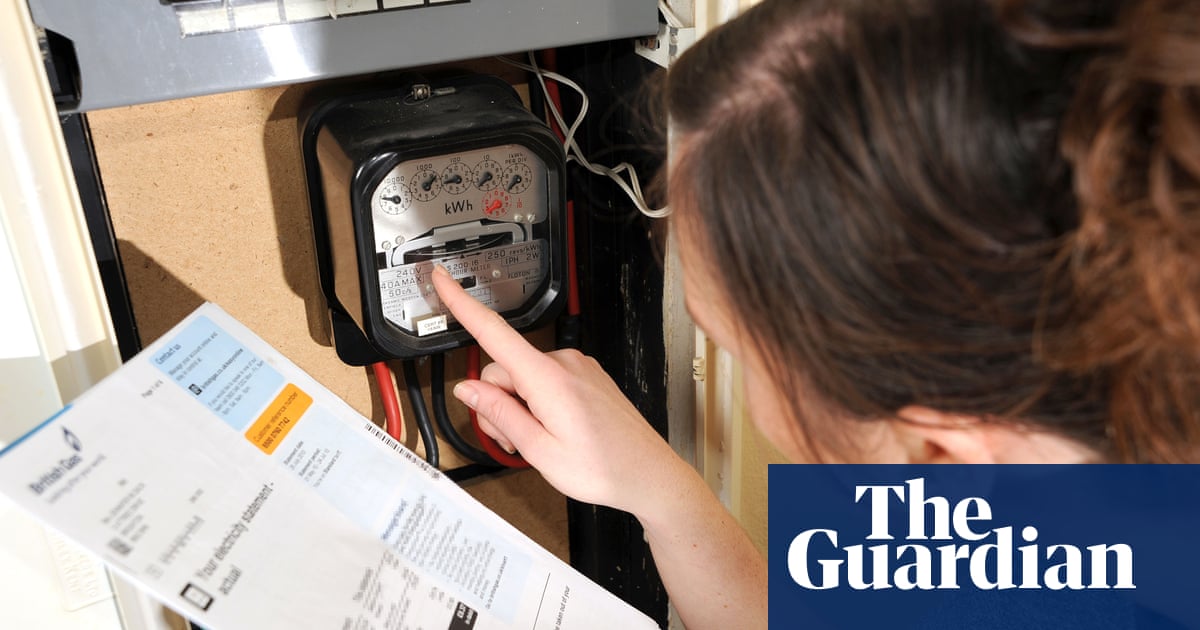
Millions of households are being urged to submit meter readings to their energy supplier this weekend to ensure they do not overpay when cheaper prices come in on Monday.
The consumer champion Martin Lewis is among those urging people to get their phones, pens and notepads out so that they benefit fully from the 12.3% cut to the Ofgem energy price cap, which is altered quarterly.
The difference between a week of energy at March’s rates compared with April’s is £4.65 for the average household, according to the comparison and switching website Uswitch.
The energy price cap in Great Britain will fall by £238 to £1,690 for the period from 1 April to 30 June, thanks to a mild winter and lower gas prices, easing the pressure on household finances a little. That figure is for a typical household that uses electricity and gas and pays by direct debit.
The average household on a standard variable tariff is expected to spend £127 on energy in April, compared with £205 in March, owing to a combination of cheaper rates and lower usage as the weather warms up, said Uswitch.
If consumers fail to submit meter readings, suppliers have to calculate bills based on estimated usage, meaning some people could be overpaying, while others may not be paying enough.
Those on standard tariffs who do not have a working smart meter and do not submit meter readings at around this time risk having some of their usage after 1 April charged at the previous, more expensive rates.
The number of affected households is estimated at 9.6 million.
Lewis, the founder of the site MoneySavingExpert, has said it is “meter reading week”. He urged those affected to try to give an up-to-date meter reading within a few days either side of the 1 April rate change, to reduce the risk of their supplier estimating that they have used more energy at the current higher rate than they actually have.
“For extra peace of mind, email yourself a time-stamped pic of the meter,” he advised.
Uswitch said that if the 9.6m households affected neglected to read their meter by 1 April, and were incorrectly charged for just a week’s worth of energy, they could risk overpaying a combined £44.6m.
Its research found that nearly a fifth (18%) of households that do not have a smart meter have not submitted their meter readings in the last three months, and 4% have not done so for a year. The advice is to submit a meter reading every month.
https://news.google.com/rss/articles/CBMidGh0dHBzOi8vd3d3LnRoZWd1YXJkaWFuLmNvbS9tb25leS8yMDI0L21hci8yOC91ay1ob3VzZWhvbGRzLXVyZ2VkLXRvLXN1Ym1pdC1tZXRlci1yZWFkaW5ncy1haGVhZC1vZi1lbmVyZ3ktcHJpY2UtY3V00gF0aHR0cHM6Ly9hbXAudGhlZ3VhcmRpYW4uY29tL21vbmV5LzIwMjQvbWFyLzI4L3VrLWhvdXNlaG9sZHMtdXJnZWQtdG8tc3VibWl0LW1ldGVyLXJlYWRpbmdzLWFoZWFkLW9mLWVuZXJneS1wcmljZS1jdXQ?oc=5
2024-03-28 05:00:00Z
CBMidGh0dHBzOi8vd3d3LnRoZWd1YXJkaWFuLmNvbS9tb25leS8yMDI0L21hci8yOC91ay1ob3VzZWhvbGRzLXVyZ2VkLXRvLXN1Ym1pdC1tZXRlci1yZWFkaW5ncy1haGVhZC1vZi1lbmVyZ3ktcHJpY2UtY3V00gF0aHR0cHM6Ly9hbXAudGhlZ3VhcmRpYW4uY29tL21vbmV5LzIwMjQvbWFyLzI4L3VrLWhvdXNlaG9sZHMtdXJnZWQtdG8tc3VibWl0LW1ldGVyLXJlYWRpbmdzLWFoZWFkLW9mLWVuZXJneS1wcmljZS1jdXQ
Tidak ada komentar:
Posting Komentar